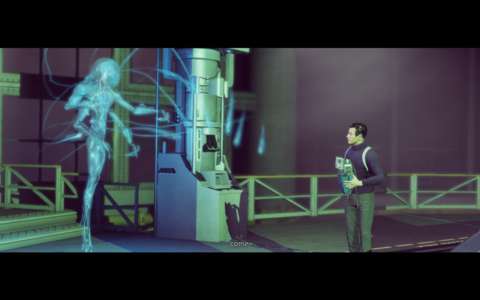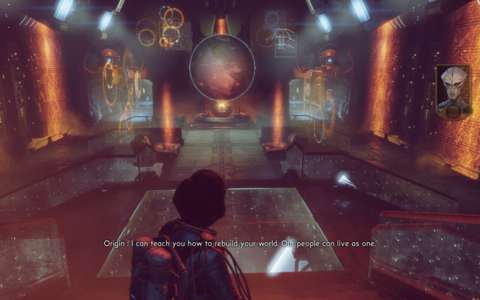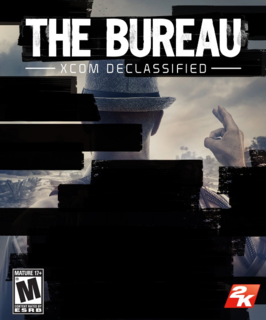There are good aliens and bad aliens: Imagine humanity had come close to extinction during an extraterrestrial invasion all evidence of which had been colored by the agency that handled the affair, the Bureau of Operations and Command, commonly XCOM.
We are in 1962 in plain Cold War era, and John F. Kennedy is the head of state who authorized this top-secret underground division to counter fears of a Soviet (or Alien) invasion. But suddenly the "Outsiders" converting innocent citizens into unconscious "Sleepwalkers" become a threat even more vital than the Commies: the Bureau's pragmatic director Myron Faulke is already ahead of the events when asking CIA special agent William Carter to deliver a mysterious briefcase to the Bureau's research labs. But the situation precipitates into a state of emergency when all of a sudden Carter himself gets shot by an "infected" colleague and J. Edgar Hoover and CIA Director Frost are killed by an out-of-mind General Deems, whereas other U.S. military bases are destroyed in attacks similar to that causing the Groom Range facility to finally implode. Fortunately, both Faulke and Carter manage to escape and are prepared to confront the alien menace now officially coordinated from the Bureau's command bunker, yet isolated from the White House and the U.S. military leaders.
In the weeks that follow, Carter is leading a team of specialists across the country in major, minor, and dispatch missions in order to secure both human personnel–scientist Weir, agent Weaver–and alien technology crucial for operation Earth reconquest. For both minor and major tasks Carter is accompanied by two squad members who can be recruited and customized with regard to the four basic classes: Support, Commando, Recon, and Engineer, including custom-made names and outfits. Additionally, a squad of various agents (whose total has to match the required mission level) can be sent to complete special tasks afield without Carter commanding them.
As third-person tactical shooter The Bureau: XCOM Declassified in several aspects might recall the Mass Effect rather than the proper XCOM strategy series, including squad formation and command. But Carter, with a drinking problem and haunted by his unhappy past (the loss of his wife and son) is no notorious hero such as Shepard, and Faulke way more utilitarian than whose mentor Anderson. The random squad members serve also a more practical than narrative interest as comparably in the famous sci-fi trilogy, neither do dreary Alan Weir / Angela Weaver (who share even the initials) have the charisma of a Mordin or Miranda, which makes attributing them a leading role in one of the alternative endings rather implausible.

However, both the forty-something Will Carter (voiced by Mark Hildreth) and the plus fifty-year-old Myron Faulke (Peter Jessop) have strong personalities that explain their later antagonism when Carter refuses to be the puppet of a pulp-like alien, reason however for his efficiency in the field, whereas Faulke prefers seeing it as a useful tool and valuable ally to push back the Outsiders' malignant presence.
The story takes several unforeseen turns, also depending on the decisions left to the player via conversation wheel, in the end it is yet Faulke's political spirit and not renegade Carter that is proven right when thanks to the good Ethereal Asaru evil Origin's psionic network Mosaic is being destroyed and with this, subsequently all signs of alien existence on Earth.

As if commander Shepard was suddenly revealed being under the Reapers' influence and substituted by Garrus, this narrative twist might come not without regret, though, as moreover the story becomes overly esoteric in the last third. Likewise, the beautiful scenery of the first major as well as minor operations that with clean lines and lively colors seems taken right out of an Edward Hopper picture book, makes successively place to generic alien structures overlaid with purple hues.
Combat difficulty also increases notably with the later chapters, albeit the sometimes demanding squad-based tactical gameplay is offset by useful upgrades for both Carter, who tops at 10 levels, and his squad members (maxing at 5 levels): perks provide additional abilities for each agent class, such as Combat Stims, Scatter, Taunt, or Diversion. While each combat situation follows a rather conventional arcade-like scheme of somewhat clichéd alien enemy classes–Sectoid grunts, Outsider footsoldiers, Scouts, and Phantoms, Elite Mutons, Heavy Sectopods, Advanced Drones–its multiple approaches require the player also to frequently recur to their Battle Focus to order the agents to move to a strategic position or to use a class-specific ability–plant a turret, use a shield, perform a takeout–while deploying the own skills and gadgets (e.g., a friendly drone or silacoid). Entering the slowish Battle Focus mode may also buy some precious time to heal the squad and seize the situation, in particular by scanning the terrain for enemies and weapons.
Whereas some abilities like Mind Control seem to have almost no effect–hacked aliens tend to rather not move at all, not getting 15 kills even with more than fifty attempts (“Enemy Within”)–, others like the drones work remarkably well for both enemies and allies: "The drone! It's healing them!" or "These drones are pretty damn helpful!," as testify the otherwise quite repetitive companion phrases (and sometimes pretty annoying screams). But if yet not effective, mind hacking a close-by Muton to temporarily not attack while getting out of reach or reviving one's squadmate might still be of use in tenser situations. While the own and squad abilities have their necessary cooldown they can also be employed simultaneously, useful in the later missions' tougher combat moments when having to get into cover, search bullets or energy clips, and oversee one's squad members all at once ("We are sitting ducks! Need orders!"). Where managing the flawed cover system–using LShift for both sprinting and cover makes quickly evading a fast-approaching foe in an obstructed area often impossible–might be as vital as regularly resorting to the F2 shortcut to regroup one's squad members, as well as to F1 to make them go-to or quick-focus on one enemy (warning: they follow it blindly).
Depending on the level of difficulty, the agents as well as Carter himself may also bleed out during combat when not revived in time, and permadead agents are definitely lost unless reloading a former checkpoint or chapter. But the game provides also sufficient remedies, such as the Support agent's level-5 Savior perk to increase the entire squad's bleed-out time, or else the Medical Pack, one of the more than twelve unlockable bonus packs offering increased maximum health, ability range, clip size, or weapon damage against (un)armored or close targets. Whereas Carter carries a primary and secondary weapon, grenades, and a backpack, the agents have only one weapon/backpack each, plus three class abilities (e.g., Turret, Shield, Plasma Field, Fire Mission).

And while Engineer and Recon might appear recommendable squadmates for most of the tasks, it is deplorable that The Bureau's missions don't have Mass Effect's epic length or number in order to permit trying out all the available perk and gadget combinations: no more than seven major plus the optional six or seven minor operations and non-playable agent dispatch missions are needed for vanquishing Origin and his Outsiders.
Despite its relatively short length and minor mechanical flaws The Bureau: XCOM Declassified is certainly a video game worth being played, for its colorful visuals recalling the US American atmosphere of the 1950s and 1960s, for its politically colored retro-sci-fi story and the protagonists' psychological portrayal, and for its solid tactical combat gameplay which should only have offered some more occasions to be put into action.
Carter may turn out to not being the story's true hero and one might end the game by simply killing him together with his good-natured alien parasite; yet the narrative disjunction has also the advantage of permitting three more alternative endings, where most players will probably choose to continue as the inerrant director Faulke; comparatively agent Weaver does provide the most radical, and doctor Weir the most humane approach to finishing with the alien plague, while one of them will be sacrificed. A final debriefing shows XCOM's efforts in controlling means and media to not leaking the truth, while Ethereal Asaru's whereabouts are unknown: No evidence of the Outsider invasion remains (while the outro music shortly quotes XCOM: Enemy Unknown's “Alien Pact”).

